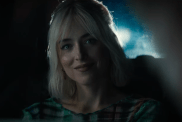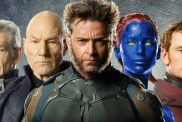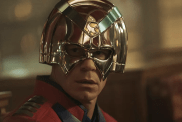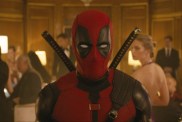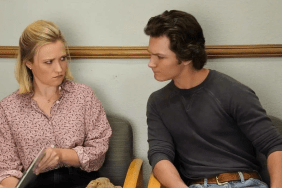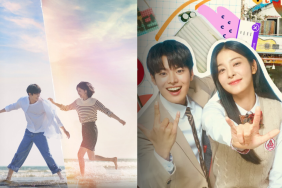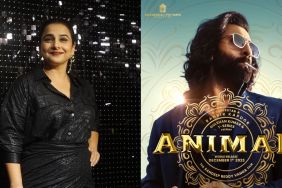There aren’t a lot of filmmakers better than Andrew Niccol at combining highfalutin science fiction concepts with visceral, and more than that, emotional stories. But after writing The Truman Show and writing and directing Gattaca, he’s poised to outdo himself with In Time, a futuristic thriller in which the aging gene has been turned off and people’s lives are quite literally defined by the amount of time they can accrue for their lives. ComingSoon.net visited the downtown Los Angeles set of his latest film in January, and spoke to Niccol as well as his two stars, Justin Timberlake and Amanda Seyfried.
Working with acclaimed cinematographer Roger Deakins (True Grit), Niccol shoots a scene in which an armored car barrels through the front window of a bank. The bank happens to hold the literal wealth of time that Seyfried’s character’s father possesses, and Seyfried and Timberlake distribute it among the customers as the authorities approach the scene. In between takes, Niccol spoke to us about the origins of the idea, and how it developed into In Time.
PHOTO GALLERY: View new photos from the thriller!
To a certain extent, this seems like a companion piece to Gattaca. When did you first come up with the idea?
Niccol: I think of it as the bastard child of “Gattaca,” because at the time I thought the holy grail of genetic engineering, of course, is to find the aging gene and switch it off. But then the implications are so huge that I thought, “that’s another movie.” And it turns out, it’s become another movie.
Does the film gain anything by being made in the middle of a recession? Or it is a more timeless tale, if you’ll pardon the pun.
Niccol: You know, the fact that at the moment the title is “Now” and it’s a futuristic film is kind of a beautiful contradiction. So yeah, when are you not going to be able to advise people to live in the moment? It should be timeless.
In addition to the socioeconomic parallels, do you have anything to say about modern culture’s obsession with beauty and youth?
Niccol: Of course – we are filming in Los Angeles! I wouldn’t say it’s Los Angeles [in the movie] but I won’t say it’s not. For me, the interesting thing is that this is the capital of staying young forever. So it seems very appropriate to be in Los Angeles.
Can you talk about Justin’s casting? It’s a big part for him.
Niccol: When I was going to Justin, some people were saying, ‘Oh maybe there is too much celebrity baggage.’ But when you take someone like Justin Timberlake into the future; a lot of the baggage stays behind, you know what I mean? It sort of gives him permission to go into another world. So you don’t sort of think, ‘Oh here he is in a contemporary movie.’ So I think that that helps. And of course he’s just a great talent.
Most of your films, certainly The Truman Show, Gattaca, and S1m0ne deal with very specific versions of the near future. Do you feel like sci-fi is the best vehicle to talk about the present or to express ideas about the present?
Niccol: Yeah. I think if you go away from the present then it’s easier to say something because people think, ‘Oh, it’s not really about me now.’ But of course it is.
After a brief hiatus, we sat down with Timberlake and Seyfried, who were happy to have a break from the intensity of filming the robbery scene.
What was it about this film that initially appealed to you?
Seyfried: The concept, for me. It was like different.
Timberlake: I had sort of two or three meetings with Andrew, before I decided to do it. It is a high-concept, though I think my conversations with him were more to find out how we could really bring out the characters as well – because I thought the idea was amazing. I think Andrew’s obviously pretty prolific when it comes to this type of concept and film. But he said he was looking to delve deeper and see what he could bring out of it with this experience, and so that seemed like it would be fun to try to [solve that] Rubik’s Cube with him. I just used Rubik’s Cube as a verb (laughs).

Do you feel pressure having to carry this movie?
Timberlake: Am I feeling the pressure to carry the movie? I don’t really look at it that way. I think it’s – I sort of, after reading the script, there’s two really interesting arcs for both of our characters, and I think there’s a little bit of – you know, the movie definitely starts off with my story, but after you meet Amanda’s character in the middle of the film, and through our sort of relationship and our affair, she has a great arc. I feel like you start off sort of seeing the film through my character, and you end up really getting a value out of Amanda’s character’s arc in the second half of the film.
So then, Amanda, how and why do you get involved? You’re a hostage initially, right?
Seyfried: It’s a boring life to sit around and try not to die, basically, which is that society. Having so much time and so much money, or whatever, it’s just everybody’s a bodyguard, nobody eats, really. It’s just a very mundane existence; they just eat egg whites and try to stay healthy, and she just wants adventure. She’s young and she’s got no one around to kind of share the same feelings with, and her dad is overly controlling and basically she just wants to get out. And she sees this guy coming from, she doesn’t know where he’s from, but he seems like trouble, in a good way. And then all of a sudden she has no choice because he takes her hostage, and I think at first it’s really scary because this is not how she would have gone about getting out of her life. But at the same time, she’s exhilarated by the danger and the experience, and also like the possibilities.
Timberlake: I think they both, you know, I think when they first meet each other in the movie, it’s sort of great for their relationship. They both see each other from other sides of the fence, because this world that we live in in this film has completely separated society into two classes. And I think Andrew always has an interesting way of writing things that when you see them in a film, you go, oh, that mirrors a bigger idea that I could relate to what’s going on in society right now. But I think specifically for our characters, we see each other from other sides of the fence, and I think we both underestimate the other one’s values. Someone who comes from nothing sees someone who has everything as probably spoiled and bratty, and whatever descriptors to relate to the opposite for her character, and I think we learn through my kidnapping her and us being shoved into this high-paced run from the law, so to speak, we learn that we actually have a lot more in common than we think. And that turns into sort of like, the other person turns into sort of like a confidante in that way, and the relationship kind of blossoms out of that.
Your relationship in the movie seems to have a fairly complex trajectory. How did you guys develop the chemistry you would need to make that journey believable?
Seyfried: We dated. We started dating the first day of rehearsal. Bought a house together.
Timberlake: I don’t know. I think what helps is that the kidnapping is such a huge vessel for how you could be sort of thrust into a high-energy or a high-consequence situation with someone else. And I think that when we actually do discover that our characters are so similar to each other, and that we couldn’t come from worlds further apart, that felt like a great vessel to develop a genuine love for each other’s characters.
How difficult was it to adjust to the generational dynamic in the film, where you have parental figures who are younger than you in real life?
Timberlake: The first week of shooting, we got all of that weirdness out of the way, so to speak, because Olivia Wilde, who plays my mom and is three years younger than me in real life, I’ve got to tell you, man, that’s officially – “The Social Network” and this film, they make me feel old, because all of the cast members are younger than me – or most of them. But yeah, it was a real challenge, and we had to spend a lot of rehearsal together sort of figuring out, I think – Olivia Wilde and I sat down in our first rehearsal, and we talked about the things that our parents do with us, you know, the things that really registered in our memory that our parents naturally do with us and always will continue to do. I mean, we all know what it’s like to have a mom, and they never really change; you go through life and they always look at you the same way. And so I think that value really helped, but I think it was one of those things where I sat and I said, you know, my mom would always do this, and she would always do this, and it was one of those things where we just really spent time together. And it’s really funny – it felt like one of those things you would do kind of in class or something, where, okay, you’re the mother and you’re the son – go! And it really did feel like that. But I think it’s just one of those things – you know, I mean, obviously you just commit. And I think Olivia was very conscious of – I don’t want to speak for her, and I’m sure you’ll get a chance to speak to her about it, but I know that she was very conscious of moving in a way that felt more motherly and maternal, and it’s definitely, when I first read it, it didn’t hit me as hard as when you actually see it. The movie is going to open with me waking up and walking into the kitchen, and any other movie where I and Olivia Wilde are the first two actors you see in the movie, you’re like, oh, they’re obviously together. But I walk in and say, “good morning, Mom,” so I’m sure it will be a shock for the audience. But you know, it’s a cool – as the movie progresses, when you see that everyone looks the same age, I think you start to let it go.

Seyfried: But they don’t act the same age, which is crazy. Like, I’m a little envious of the people that get to play these older characters, like Vincent [Kartheiser], because in my career I like to look for characters that are so unlike me, and then that’s the challenge, trying to relate to somebody like that. So he’s trying to relate to somebody who’s like 80 years old, I think his character is like 80 years old, and it’s just so weird and you have to study that, and the nuances of like someone that’s lived like 60 years more than you. It’s crazy to think about!
Timberlake: I actually think Matt Bomer had the most challenging role in the movie. I mean, he plays like 115 or 116 or something like that, and I don’t even know what you would research to try to figure that out. And I think it’s just one of those things that you sort of ask yourself at some point, what would you hope – what values and characteristics would you hope to have if you got to live that long? And I think you would hope for a certain type of grace and a certain type of patience – things obviously none of us possess.
Seyfried: Maybe we’re realizing that we’re actually more similar to our elders than we think, just because of the way we look.
Timberlake: Yeah, yeah! Absolutely. I think this is the type of movie where a lot of people walk out and ask those certain types of questions. And I think you have to go back to the beginning of where we started, and I think that’s a big reason why I said yes to this movie. Because it made me ask so many questions about myself, and that’s an interesting exercise. So hopefully the audience or the moviegoer will have that same experience.
Talk about the level of action in this. How physical is this film, and is that more than you’re used to?
Seyfried: It’s the most physical movie in the world.
Timberlake: It’s the most physical movie in – the – world.
Seyfried: It’s kinda, it’s kinda true.
Timberlake: We were trying the other day to figure out if there was a movie where there was more running, other than like “Run, Lola, Run” or “Forrest Gump,” maybe. But yeah, I dig it. I think it’s a huge part of the movie. Where my character comes from, we don’t have time to walk at a normal pace, we have to move quickly. When you first see my character, we shot the scene right before. We shot the opening sequence right before Christmas break and it was so surreal to sort of – it all really came together for me because I started in this little door and then as soon as I stepped out there were all these extras walking at a pace that looked so uncomfortable. And it’s jarring when you first see it in rehearsal, but when you think about. When I think about the first time I read the script, and what I sort of imagined that – it was exactly how I imagined and you see everybody walking at a pace that would make New Yorkers look like they were walking…
Seyfried: Like caterpillars
Timberlake: Yeah, look like caterpillars. I don’t feel like this is an action movie more than it is a thriller, because I feel like the running is a huge character of the movie, because it relates to the time that you don’t have to live. But injuries are just reminders that, again, that you’re not as young as you used to be. And the funny thing is you train for it, you train to get ready for it. But still, you take a pro athlete, they warm up for an hour, they play a game for three hours and then they go ice and they’re done for a week. And they go next Sunday and they do the same thing. And we’re on set for 10 hours, 12 hours and ten of those some days we’re running.
What do you look for in a role when you’re picking a role? Both of have been lucky enough to tackle a wide variety of challenges.
Seyfried: Diversity.
Timberlake: Yeah, I mean, I think you sort of see things in yourself in the character and see things that maybe you feel like you don’t possess or could be better at as a person sometimes, but I think diversity probably does have a lot to do with it. I’d say the number one thing is do you feel safe in the hands of the director and is the material interesting in a way that moves you. And for me, that’s the basic rule of thumb, but I don’t find that it’s just for my character. You know, of all [my] movies, I loved the characters. I loved all the characters and they all had such great values to me that I find myself looking at all of them and saying, what’s specific and special about that person? And a big part of it was Amanda’s character and the values that she, her character gets to have in the second half of the film, because I think it comes from a different angle, so I found myself really relating to her character as well in a way. But good stories, good directors, I don’t know, it’s pretty simple. For this movie specifically, I had just never seen material like this. And Andrew writes and directs with such care, and I think really at the end of the day what pushed me to where we are right here was really Andrew. To hear his take on the movie and to hear his passion and where he comes from and what it meant to him and what was beautiful about it to him, it just felt really inspiring. And that’s contagious, you know. That overwhelming inspiration, when you see it someone, you’re like, oh man, I’m not going to regret this experience because it’s going to be filled with care and unbelievable amount of energy.
In Time opens in theaters on Friday, October 28.
